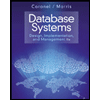Employees(employee_id, first_name, last name, salary, hire_date, job_title, manager_id) Which of the following queries will display the last name and job title of employees who get more than the average salary? Select one: a.SELECT last_name, job_title FROM employees WHERE salary > (SELECT avg(salary) FROM employees); b.SELECT last_name, job_title FROM employees WHERE salary >(SELECT max(salary) FROM employees); O c.SELECT lasttname, job_title FROM employees WHERE salary >(SELECT count(salary) FROM employees); O d.SELECT lastname, job_title FROM employees WHERE salary >(SELECT sum(salary) FROM employees);
SQL
SQL stands for Structured Query Language, is a form of communication that uses queries structured in a specific format to store, manage & retrieve data from a relational database.
Queries
A query is a type of computer programming language that is used to retrieve data from a database. Databases are useful in a variety of ways. They enable the retrieval of records or parts of records, as well as the performance of various calculations prior to displaying the results. A search query is one type of query that many people perform several times per day. A search query is executed every time you use a search engine to find something. When you press the Enter key, the keywords are sent to the search engine, where they are processed by an algorithm that retrieves related results from the search index. Your query's results are displayed on a search engine results page, or SER.

Step by step
Solved in 2 steps









